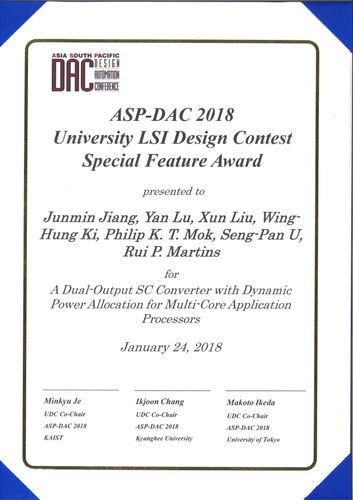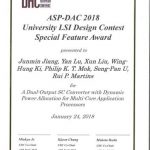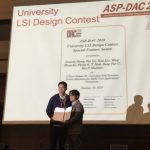 UM chip and paper receive ASP-DAC 2018 University LSI Design Contest Special Feature Award
UM chip and paper receive ASP-DAC 2018 University LSI Design Contest Special Feature Award
A microelectronics chip and a paper titled ‘A Dual-Output SC Converter with Dynamic Power Allocation for Multi-Core Application Processors’ from the University of Macau (UM) recently received the University LSI Design Contest Special Feature Award at the 23rd Asia and South Pacific Design Automation Conference (ASP-DAC 2018). The design from UM proposes a new dual-output switched-capacitor power converter with dynamic power-cell allocation for reducing the chip area and increasing the power conversion efficiency for multi-core microprocessors.
The ASP-DAC was founded in 1995 and is co-sponsored by the Association for Computing Machinery (ACM) and the Institute of Electrical and Electronics Engineers (IEEE). The University LSI Design Contest has been conceived as a unique programme at ASP-DAC. The purpose of the contest is to encourage research in LSI design at universities and its realisation on a chip by providing opportunities to present and discuss the innovative and state-of-the-art design.
This year, the University LSI Design Contest Committee received 34 high-quality designs from five countries and regions. 27 of them were selected for oral presentation and poster presentation. Two Best Design Awards and three Special Feature Awards were presented to five outstanding designs. The winning chip was designed in Macao by visiting student Jiang Junmin from the Hong Kong University of Science and Technology (HKUST). The project was advised by Prof Lu Yan from UM’s State Key Laboratory of Analog and Mixed-Signal VLSI as well as other colleagues from UM and HKUST.
View gallery


